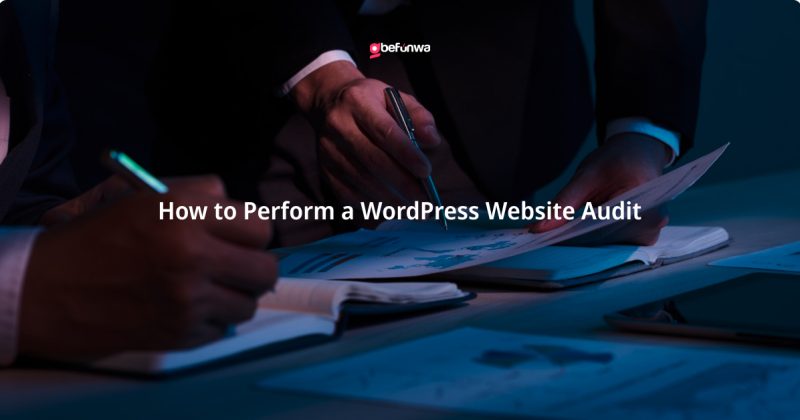
Regularly auditing your WordPress website is essential for ensuring optimal performance, security, and user experience. A thorough website audit allows you to identify areas for improvement, address potential issues, and enhance overall functionality. Here’s a detailed step-by-step guide on how to perform a WordPress website audit effectively.
Begin by assessing your website’s performance metrics, including page load speed, server response time, and overall responsiveness. Utilize tools like GTmetrix, Pingdom Tools, or Google PageSpeed Insights to generate performance reports and identify areas that require optimization. Pay attention to factors such as image optimization, caching, and server configurations to enhance speed and user experience.
Security is paramount for protecting your WordPress website against potential threats and vulnerabilities. Conduct a security audit by reviewing your website’s plugins, themes, and core files for any outdated or vulnerable components. Install security plugins like Wordfence or Sucuri Security to scan for malware, suspicious code, and potential security loopholes. Additionally, ensure that your website’s SSL certificate is up-to-date and properly configured to encrypt data transmission and enhance security.
Evaluate the quality, relevance, and accuracy of your website’s content to ensure it aligns with your brand identity and objectives. Check for spelling and grammar errors, outdated information, and broken links that may detract from the user experience. Consider conducting keyword research to optimize your content for search engines and enhance visibility. Refresh outdated content, add new pages or blog posts, and remove irrelevant or duplicate content to improve overall content quality and engagement.
Review your website’s design, layout, and navigation structure to ensure a seamless and intuitive user experience. Test your website across different devices, browsers, and screen sizes to identify any compatibility issues or design inconsistencies. Pay attention to factors such as mobile responsiveness, readability, and accessibility compliance to enhance usability for all users. Consider gathering feedback from real users or conducting usability testing to gain insights into areas for improvement.
Accessibility is crucial for ensuring that your website can be used and navigated by individuals with disabilities. Evaluate your website’s accessibility compliance by testing for keyboard navigation, screen reader compatibility, and color contrast ratios. Use accessibility testing tools like WAVE or Axe to identify accessibility issues and implement necessary fixes. Ensure that your website adheres to Web Content Accessibility Guidelines (WCAG) standards to promote inclusivity and accessibility for all users.
Analyze your website’s traffic and user behavior data using tools like Google Analytics or Jetpack Stats. Review key metrics such as traffic sources, bounce rate, and conversion rates to gain insights into user engagement and website performance. Identify popular pages, high-traffic keywords, and top-performing content to inform your content strategy and optimization efforts. Use analytics data to track progress over time and make data-driven decisions to improve website performance.
Regularly backup your WordPress website to ensure that you have a recent copy of your data in case of emergencies or data loss incidents. Verify that your backup system is functioning correctly and that backups are stored securely offsite. Additionally, review your website’s update status for WordPress core, themes, and plugins. Update outdated components promptly to patch security vulnerabilities, fix bugs, and ensure compatibility with the latest WordPress version.
Perform an SEO audit to evaluate your website’s search engine visibility and identify opportunities for optimization. Conduct keyword research to identify relevant keywords and phrases for your target audience. Optimize meta tags, headings, and content with targeted keywords to improve organic search rankings. Ensure that your website’s sitemap is submitted to search engines and that your website is indexed properly for maximum visibility.
In conclusion, performing a comprehensive WordPress website audit is essential for maintaining and optimizing your online presence. By evaluating performance, security, content, design, accessibility, analytics, backups, updates, and SEO, you can identify areas for improvement and implement strategic changes to enhance overall website functionality and user experience. Regular audits ensure that your WordPress website remains secure, efficient, and competitive in the ever-evolving digital landscape.
Deborah Oludimu is an experienced content writer with 3+ years of experience. She is skilled in research, writing, and editing to produce high-quality, engaging content across industries. Deborah is passionate about creating content that informs and inspires
© 2025 GBEFUNWA.COM. All rights reserved.
The WordPress® trademarks are the intellectual property of the WordPress Foundation, and the Woo® and WooCommerce® trademarks are the intellectual property of WooCommerce, Inc. Uses of the WordPress®, Woo®, and WooCommerce® names in this website are for identification purposes only and do not imply an endorsement by WordPress Foundation or WooCommerce, Inc. gbefunwa is not endorsed or owned by, or affiliated with, the WordPress Foundation or WooCommerce, Inc.